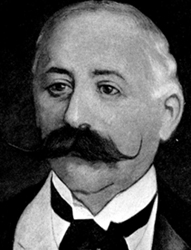|
| |||||||
|
Click On Our Logo To Return To The PJAC Homepage | |||||||
 |
|||||||||||||||||||
 |
|||||||||||||||||||
|
Baron Maurice de Hirsch (1831-1896) |
|||||||||||||||||||
|
"My own personal experience, too has led me to recognize that the Jews have very good ability in agriculture...and my efforts shall show that the Jews have not lost the agricultural qualities that their forefathers possessed. I shall try to make for them a new home in different lands, where as free farmers on their own soil, they can make themselves useful to that country." --Baron Maurice de Hirsch in The Forum (August 1891) |
|||||||||||||||||||
 |
 |
 |
|||||||||||||||||
|
Baron Maurice de Hirsch, a Jewish-German financier and philanthropist dedicated his fortune to the welfare of Eastern European Jews at a time when worsening conditions in Russia made mass emigration a necessity. Hirsch's estate, estimated at $100 million by 1890, resulted from his pioneer enterprises in the sugar and copper industries and management of the Turkish railway, which linked Constantinople to Europe. His experiences
in the Ottoman Empire alerted him to the plight of Middle Eastern
Jewry. Convinced that modern secular education would alleviate
the miserable conditions faced by Jews, he gave one million francs
($200,000) to the Alliance Israelite Universelle for
the creation of schools. In 1891, the czarist government of
Russia had refused Hirsch's offer of 50 million francs ($10,000,000)
to establish a modern educational system for Jews, because it was
not given complete control over the allocation of the funds.
Hirsch was approached by | |||||||||||||||||||
 |
 |
 |
|||||||||||||||||
|
Therefore, Hirsch envisioned the transformation of Eastern European Jewry into a class of independent farmers and handicraftsmen in the New World. He established the New York based Baron de Hirsch Fund in 1891 facilitate this goal. Hirsch recruited Mayer Sulzberger, William B. Hackenburg, Jacob H. Schiff, Myer S. Isaacs, Oscar S. Straus and other American Jewish leaders to serve as officers and trustees. Later that same year, Hirsch created the Jewish Colonization Association to facilitate mass emigration of Jews from Russia to agricultural colonies particularly in Argentina and Brazil. The desire of Hirsch and his Fund's leadership to recast Eastern European Jewish immigrants in the image of "biblical farmers" was shaped by a mix of attitudes. The trustees wanted to reverse the historic discrimination that banned their Eastern European brethren from farming. At the same time, they shared a negative Western European stereotype of Eastern European Jews as unskilled workers, beggers and peddlers. Therefore the goal of the Fund's leadership was to improve the lot of Eastern European Jews and transform them into a socio-economic class acceptable to the tastes of the 19th century Jewish elite.
|
|||||||||||||||||||